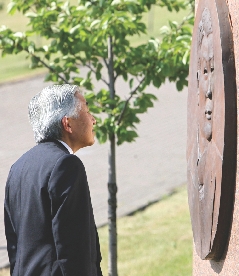AFTERWORD
A Message from Hiroki Sugihara
Each time that I think about what my father did at Kaunas, Lithuania, in 1940, my appreciation and understanding of the incident continues to grow. In fact, it makes me very emotional to realize that his deed saved thousands of lives, and that I had the opportunity to be a part of it.
I am proud that my father had the courage to do the right thing. Yet, his superiors in the Japanese government did not agree. The years after my family left Kaunas were difficult ones. We were imprisoned for eighteen months in a Soviet internment camp; and when we finally returned to Japan, my father was asked to resign from diplomatic service. After holding several different jobs, my father joined an export company, where he worked until his retirement in 1976.
My father remained concerned about the fate of the refugees, and at one point left his address at the Israeli Embassy in Japan. Finally, in the 1960s, he started hearing from “Sugihara survivors,” many of whom had kept their visas, and considered the worn pieces of paper to be family treasures.

Japanese Emperor Akihito visits a monument dedicated to Chiune Sugihara in Vilnius, Lithuania. Several monuments around the world honor Sugihara.
In 1969, my father was invited to Israel, where he was taken to the famous Holocaust memorial, Yad Vashem. In 1985, he was chosen to receive the “Righteous Among Nations” Award from Yad Vashem. He was the first and only Asian to have been given this great honor.